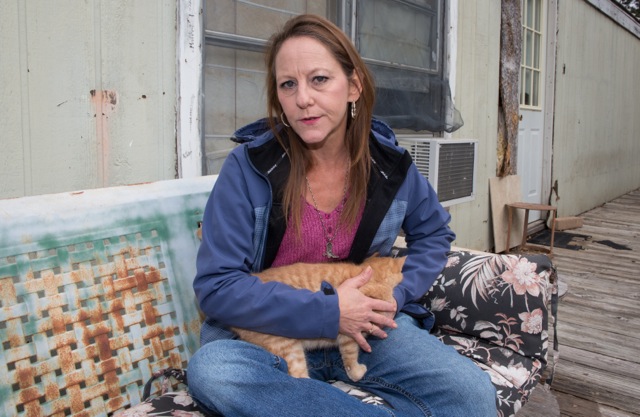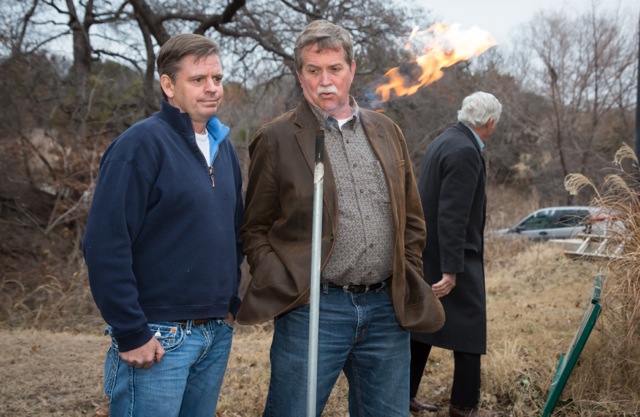Eight members of Congress, led by Democratic Representative Matt Cartwright (PA), have written to the head of the Environmental Protection Agency (EPA) asking it to “investigate and address” water contamination in Dimock, PA, Parker County, TX, and Pavillion, WY.
The EPA‘s initial investigations indicated drinking water contamination was caused by oil and gas extraction. The EPA compelled industry to provide clean water to those affected, but later abandoned its investigations without issuing final reports, letting industry off the hook.
In the letter to Gina McCarthy, head of the EPA, requesting the agency reopen its investigations, the congressmen state, “A patchwork of state regulations, exemptions from many of our federal environmental laws and a lack of enforcement have forced communities living in and near to heavily drilled areas to pay the price for the [fracking] boom.”
This is welcome news for people like Texan Shelly Perdue, who can set her water on fire. She lives about 600 feet from the Range Resources’ hydraulic fracturing site that the EPA held responsible for contaminating Steven Lipsky’s well water in 2011.
Her trailer home is just as much her castle as Lipsky’s sprawling mansion is his. She owns her land outright and saw her place as her own private paradise until Range Resources started operations across the street. Though her property wasn’t part of the EPA’s initial investigation, scientists from Duke University and the University of Arlington have included her water in studies currently in progress.
Shelly Perdue on her front porch ©2014 Julie Dermansky
Unlike Lipsky, she doesn’t have the financial means to have water trucked in. She won’t drink her well water, but she uses it for everything else. Methane escapes when her water is turned on, filling her home with levels considered to be explosive. Perdue can’t afford to move so she vents her home the best she can.
After the EPA investigation of Lipsky’s contaminated well water concluded the fracking company was responsible, it issued an emergency order compelling Range Resources to deliver clean water to Lipsky.
The Texas Railroad Commission, which regulates the oil and gas industry in Texas, disputed the EPA‘s findings, as did Range Resources. Though the EPA rescinded its emergency order 15 months later in a move to settle lawsuits with Range Resources, the EPA came under fire by a group of Republican senators who believed the agency overreached by conducting the investigation and asked the Inspector General to investigate. The Inspector General cleared the EPA of wrongdoing in a report issued at the end of last year.
Despite the Inspector General’s findings, the House Science, Space and Technology Committee held a hearing in January 2014 entitled “Examining the Science of EPA Overreach: A Case Study in Texas.”
Texas Railroad Commissioner David Porter’s statement prepared for the hearing states: “Thanks to the oil and gas industry’s best practices and strict regulation and enforcement by the Railroad Commission, there has never been a confirmed case of groundwater contamination due to hydraulic fracturing in Texas.”
His testimony reiterates that the Texas Railroad Commission already cleared Range Resources of any wrongdoing. And the commission has dismissed the EPA’s findings, including the isotopic data provided by Dr. Geoffrey Thyne that indicated Range Resources’ well could be the source of methane in Lipsky’s well.
Parker’s testimony reads: “The EPA has proved to be a sensational, unscientific, and politically motivated bureaucracy, tasked with furthering the current administration’s anti-fossil fuel agenda.”
Lauren Pagel, policy director of Earthworks, an environmental organization, points out that no one from the Inspector General’s office or anyone directly affected by fracking was invited to testify.
“Whether it’s climate change or fracking, this committee ignores the science they don’t like when it undermines the conclusions they’ve already reached,” she says.
Meanwhile, the Americans Against Fracking advisory board and more than 200 other groups addressed a letter to President Obama, asking him to compel the EPA to reopen its investigations into water contamination, which the EPA had already started but never concluded.
The groups say the EPA abdicated its responsibilities and local residents have paid the price. They point out that the Inspector General’s report raised questions about the EPA‘s decision to drop its investigation in Parker County and urged the president to take action.
Besides the EPA‘s own initial reports into water-well contamination in Parker County, scientists from Duke University found levels of methane above explosive levels in residents’ homes, including Perdue’s and Lipsky’s. So did Stacey Systems Inc, an independent lab Lipsky hired to test his and some of his neighbors’ wells.
The Railroad Commission reopened its investigation this year after more residents filed complaints about contaminated water and Duke University released results showing higher levels of contamination in the air and water in the area than their own previous reports showed. Duke University’s results show combustible levels of methane in some of the wells.
Democratic Rep. Lon Burnam with Steven Lipsky at an open house he held to show the public he can light his water on fire. Burnam and Lipsky stand next to the water well’s gas vent that is also flammable when he turns the well on. ©2014 Julie Dermansky
People like Perdue and Lipsky are left wondering whom the EPA serves. Lipsky went to the hearing held by the House Science Committee and tried to talk to Gina McCarthy outside, but says she wouldn’t speak to him. The Americans Against Fracking advisory board has asked McCarthy to meet with affected citizens, and noted she has met with leaders of the fracking industry.
In the meantime, Perdue lives in constant fear.
“If my house catches on fire I wouldn’t even be able to use my water to put it out, because it could make it worse,” she says.
It’s as if teams for and against the EPA regulating industry are stuck in a ping pong match while the citizens whose lives are at stake watch from the sidelines.
Subscribe to our newsletter
Stay up to date with DeSmog news and alerts








